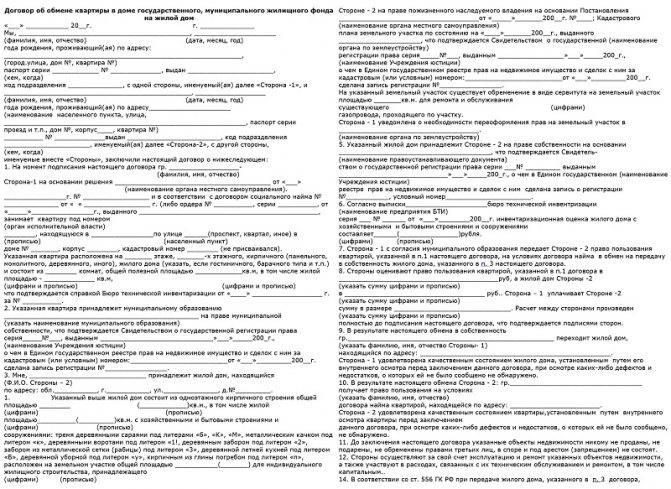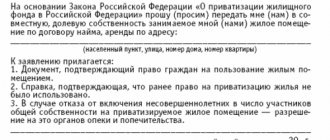G. Alekseev Author of the article
Current legislation provides for such a basis for legal transfer as exchange. The right of use can be transferred in a similar manner. Thus, when living in an apartment on the basis of a social tenancy agreement, ownership rights do not arise before privatization, however, it is possible to exchange for premises with the same form of ownership (that is, municipal).
Legislative grounds for the exchange of municipal housing
The Housing Code (LC) regulates the possibility of exchanging non-privatized living space. So, it has a separate article devoted to this issue. According to Art. 72 of the Housing Code of the Russian Federation, the rules for the exchange of municipal housing are as follows:
- an exchange can be made in the case of using housing under a social tenancy agreement only after receiving written consent from the owner, as well as from all residents of the premises;
- The tenant can exchange the living space only for the same - municipal;
- when choosing an alternative premises, all residents have the right to vote: they can demand to change to a certain living space or even premises in different houses or rooms in different apartments;
- on the issue of choosing housing, consensus may not be reached, then each of them has the right to demand forced exchange through the court;
- in a special order, the exchange of living space is carried out where children or citizens with limited legal capacity and those who are completely incapacitated live: the guardianship and trusteeship authorities are involved here, and written consent to the exchange is required from them;
There is no legal limit on the number of participants, so any number of citizens can participate in the exchange procedure.
Is it possible to exchange a non-privatized apartment for a privatized one?
According to the existing law of the Russian Federation, only its rightful owner can dispose of his apartment; it is not allowed to sell municipal housing, but it is possible to exchange it. But this will require written permission from the landlord, as well as family members living in the premises together with the tenant.
You can find out how to properly exchange a non-privatized apartment by reading the Housing Code of the Russian Federation (Articles 72-75). This document prohibits moving to another apartment in the following cases:
- if the right to use this residential premises by the tenant is disputed in court;
- if the tenant has received a claim to amend or terminate the social tenancy agreement;
- housing is recognized as unsafe or unsuitable for living in;
- the house is intended for demolition or will be converted for other purposes;
- the house is subject to major renovation, during which the premises will be redeveloped;
- the apartment is communal, and during the exchange a person who has a serious chronic disease can move in, which can infect other residents of the communal apartment (RF Government Decree No. 378 provides a list of diagnoses).
It is also worth noting that a big problem for owners of municipal housing can be an agreement that clearly states that residential premises cannot be exchanged. In this case, this process becomes significantly more complicated; the only way is to renew the social tenancy agreement.

Many people are interested in the question: is it possible to exchange a non-privatized apartment if the apartments are located in different localities. If the exchange has been approved by the landlord, then such a transaction is permitted. The exchange may be prohibited if, after moving to another city, each family member receives an area that is less than the required norm (the accounting norm is different in each region).
As you have already noticed, there are many obstacles to exchanging non-privatized housing, but if all these cases do not concern your apartment, then you can safely apply for permission to exchange from the municipal authorities where the social tenancy agreement was concluded, and then start looking for the necessary living space.
When is it not possible to exchange living space?
The law establishes some restrictions on transactions involving the exchange of non-privatized premises. According to the rules of Article 73 of the RF Housing Code, these are the following circumstances:
- a claim has been filed against one of the citizens exchanging living space for termination or modification of the terms of the social tenancy agreement;
- the right to use one of the apartments by the tenant is currently being challenged in court;
- the dwelling for which citizens were going to exchange their apartment was declared unfit for living in the manner prescribed by law;
- the house in which one of the living spaces is located is prepared for demolition;
- Residential premises located in a building in which major renovations are planned, the implementation of which will also affect apartments, cannot participate in the transaction;
- if, as a result of the exchange, a person is accommodated in a communal apartment with a disease, the presence of which, by law, requires special living conditions (clause 4, part 1, article 51 of the Housing Code);
- if a citizen and his household members, as a result of a housing exchange, become in need of expanded living space.
If none of the above points suit your case, then you can exchange housing.
When is exchange not possible?
You should not count on a free exchange of living space. Article 73 of the RF Housing Code limits certain types of real estate transactions.
In what cases is a ban on housing exchange issued:
- If the employer does not have a social tenancy agreement or a claim is brought against him.
- The use of a non-privatized apartment is disputed in legal proceedings.
- The authorities plan to demolish the house (see “Demolition of privatized housing”).
- Intent for major home repairs and refurbishment of residential premises (technical changes).
- Housing is classified as service, emergency or dilapidated.
- If after the exchange a person with a chronic disease will live in the apartment (clause 4, clause 1, article 51 of the Housing Code of the Russian Federation).
Here's an example:
Retired soldier Samoilov lived in an official apartment of the Ministry of Defense of the Ministry of Internal Affairs. Moving to another city, Samoilov planned to move into a new apartment. There was no finance to buy housing, so the retiree decided to exchange his official housing for social housing. Having found a potential employer, Samoilov agreed on the terms of the deal - then the parties applied for permission from the municipality. Samoilov was denied an apartment exchange because... the housing did not belong to the municipality, but to the Ministry of Defense of the Russian Federation. It is logical that military housing was also denied. The reason is that the service apartment was provided to Samoilov for his military service. Housing is not subject to privatization, exchange or sale.
Consequently, if at least one of the specified conditions is identified, the exchange of a non-privatized apartment will become impossible.
Algorithm for exchanging non-privatized living space
The specifics of registering the exchange of housing used by tenants under social tenancy agreements are described in Article 74 of the Housing Code. In general terms, the order of exchange is as follows:
- obtaining consent from all residents and the property owner;
- selection of an alternative option;
- the exchange itself and the corresponding procedure for completing the transaction;
- if for some reason no agreement is reached on key points, then the exchange can be carried out in court.
If the parties come to an agreement, then previously concluded social employment contracts are subject to termination, and new ones are concluded in their place within ten days.
Documentation
When exchanging a non-privatized apartment, you need to prepare the following package of documents:
- Passports of all residents (and birth certificates for minors).
- Social rental agreement.
- Extract from the Unified State Register of Real Estate.
- Extract from the house register.
- Permission from the guardianship authorities.
- Consent to the deal from the municipality.
- An extract from the personal account of the apartment (to know about the presence or absence of debt).
Since it is most reliable to act through experienced legal representatives, it is necessary to issue a power of attorney for them. This document, along with the representative’s passport, is also required when completing the transaction.
Exchange agreement for a non-privatized apartment or housing

Exchange in court
It should be mentioned that only a non-privatized apartment can be subject to forced division - the property of citizens cannot be forcibly exchanged. To carry out this procedure, the citizen who filed the claim should find alternative housing options.
By the way, forced exchange is quite rare, since it is usually disadvantageous to any of the participants in the process. Citizens who interfere with the exchange are not allowed to select housing options. Consequently, they can only move to where the court decides. This is also disadvantageous for the plaintiff himself - the trial may drag on, so it is difficult to find an employer willing to wait until the trial is over.
How to change public housing?
The answer to the most important question in this case is: yes, exchanging a non-privatized apartment is possible. This requires:
- So that there are no obstacles to exchange established by law.
- To have permission from the owner (usually from the local government, since there is not much publicly owned housing).
- So that all participants in the exchange agree.
Circumstances that impede the transaction
The following circumstances serve as obstacles to the exchange of non-privatized apartments:
- The owner does not agree to replace the party in the social tenancy agreement.
- The right to use housing is being challenged in court.
- The building in which one of the apartments is located is recognized as unsafe or subject to demolition.
- A major overhaul with redevelopment of living quarters inside the house is planned.
- There is an exchange of rooms in a communal apartment, where as a result a person suffering from one of the chronic diseases included in a special list (active tuberculosis, oncology with heavy discharge, etc.) can be moved in.
A complete list of diagnoses that make it impossible to live within the same apartment is established by Decree of the Government of the Russian Federation No. 378 of June 16, 2006.
FAQ
Is it possible to exchange a non-privatized apartment if there are debts on utility bills?
There is no legal prohibition on exchanging a home with a debt. Circumstances preventing the exchange are specified in Article 73 of the Housing Code (LC), and among them there are no debts on housing and utility payments. The only thing that can interfere with the exchange is litigation over debt, since this is a condition for prohibiting such a transaction (Article 73 of the RF Housing Code).
An important condition for the legality of a transaction in accordance with Art. 72 of the Housing Code is considered to be the consent of both the landlord and all residents of the exchanged living spaces. So, if all named persons agree to an exchange if there is debt, then the transaction is possible.
Does a tenant have the right under a social tenancy agreement to sell the housing they are using?
According to the rules of the current legislation, issues of handling non-privatized housing are regulated by the Housing Code, which does not provide for sales. And issues of purchase and sale are considered by the Civil Code (Article 549), but only after privatization has been carried out.
Therefore, you can sell municipal housing either after transferring it to private ownership, or in an “unofficial” way. To carry out the latter, the tenant registers the buyer in the rented living space. As a result, the buyer has the right to live in the apartment, and in the future can privatize the apartment. The seller checks out of the property. And the transfer of funds occurs by issuing a receipt. A purchase and sale agreement is not drawn up, so this path is fraught with great risks.
Conclusion
Municipal housing is not the property of the people who live in it. Housing is provided to residents under a social rental agreement. Therefore, the employer does not have the right to dispose of it at his own discretion.
The Housing Code of Russia allows the exchange of municipal housing for real estate with the same status only with the permission of the administration (landlord) and all people registered in the apartment.
Moreover, when exchanging, each family member must have at least 10 square meters of living space. If there are children in the family, then the consent of the guardianship authorities is required for the exchange.
If at least one member of the tenant’s family registered in the apartment opposes the exchange, then the property will be exchanged only with the consent of the court.





